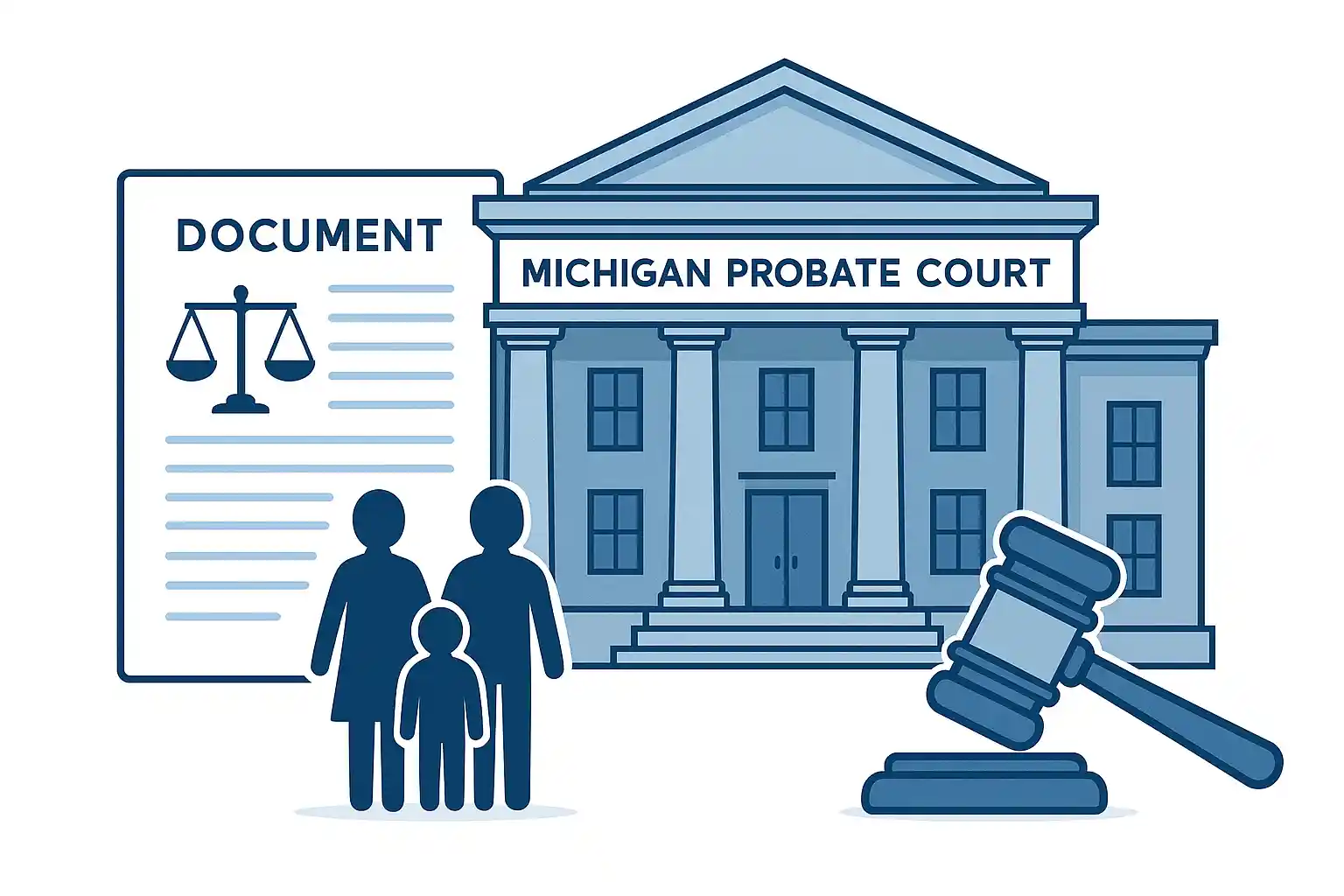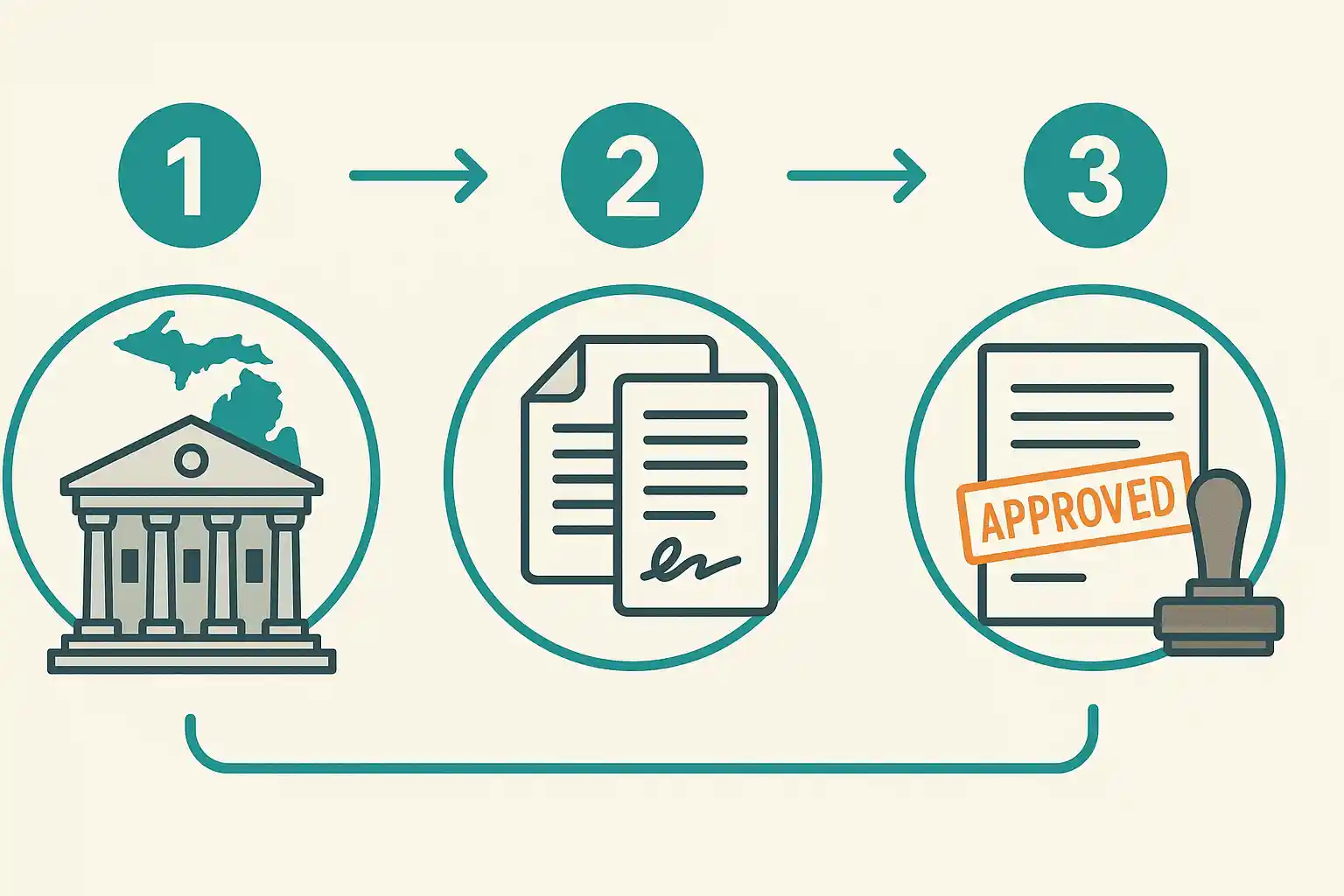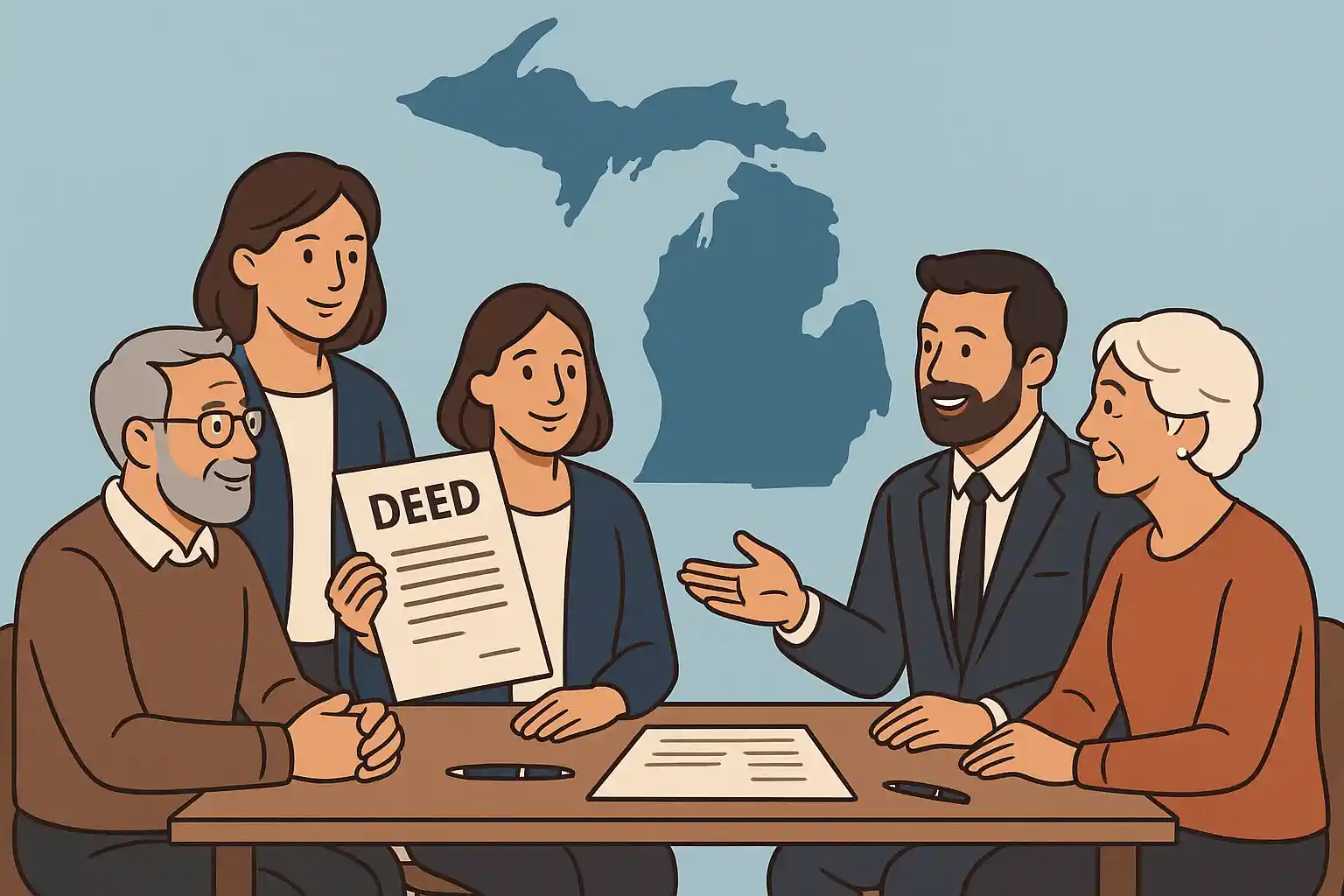Learning how to sell inherited land in Michigan requires navigating probate court approval, understanding tax advantages like step-up basis, and coordinating with multiple heirs. While the process typically takes 6-8 months through traditional sales, cash buyers can close within weeks once probate clears, making inheritance decisions less stressful during difficult times.
Key Takeaways:
- Michigan probate law requires court approval before selling inherited land, adding 30-60 days to your timeline even after finding a buyer.
- You'll receive a "stepped-up basis" equal to the land's value at death, potentially eliminating capital gains taxes on inherited property.
- Cash buyers can close within 2-3 weeks after probate completion, while traditional sales typically take 6+ additional months.
Quick Note: Prefer a hassle-free sale? We buy Michigan land directly from owners and can give you a free cash offer today. If you want to learn how to sell your inherited land, continue reading!

Understanding Michigan Probate Laws for Inherited Land
Dealing with inherited land in Michigan can feel overwhelming, especially when you're already grieving the loss of a loved one. The good news is that Michigan's probate system is designed to help families navigate this process, though understanding the specific requirements can save you time, money, and stress down the road.
Michigan's Three Probate Pathways
Michigan offers different probate processes depending on your situation:
• Informal Probate - The most common and streamlined option when all heirs agree and there are no disputes
• Formal Probate - Required when there are contested issues, unclear wills, or complex family situations
• Small Estate Process - Available for estates valued under $24,000, though land rarely qualifies due to property values
Most inherited land cases go through informal probate, which typically takes 4-6 months minimum. This process requires court supervision but moves more quickly than formal probate when families cooperate. Understanding all the Michigan land sale legal requirements upfront can help streamline the probate process.
Key Michigan Requirements for Land Inheritance
Before you can sell inherited land, Michigan law requires several critical steps. The probate court must officially transfer the property title from the deceased person's name to the rightful heirs. This involves filing a petition with the probate court in the county where the property is located, not necessarily where the person died.
You'll need to provide a certified death certificate, the original will (if one exists), and a complete inventory of all estate assets, including the land's current market value. Michigan courts also require publication of legal notices to potential creditors, creating a waiting period before final distribution.
Timeline and Personal Representative Duties
The personal representative (called an executor in other states) plays a crucial role in Michigan probate. They're responsible for managing the estate, paying debts, filing tax returns, and ultimately distributing assets to heirs. If you're selling inherited land, the personal representative must obtain court approval before any sale can proceed.
This legal framework protects heirs but can create delays when you need to sell quickly. Understanding these requirements upfront helps you prepare for the journey ahead and consider whether alternative options might better serve your family's needs during this difficult time.

Step-by-Step Process to Sell Inherited Land in Michigan
Selling inherited land in Michigan involves several legal steps, and the Michigan FSBO land requirements, that must be completed in the right order. While the process can seem daunting, breaking it down into manageable phases helps you understand what to expect and when you'll be able to move forward with a sale.
Phase 1: Initiate Probate Proceedings
The first crucial step is filing with the appropriate Michigan probate court, which must be done in the county where the deceased owned the land. You'll need to gather several essential documents before heading to court:
- Certified death certificate (multiple copies recommended)
- Original will and any codicils, if they exist
- Complete list of all heirs and their contact information
- Property deeds and tax records for the inherited land
Within 14 days of filing, Michigan law requires you to send notice to all interested parties, including heirs, beneficiaries, and creditors. The court will then appoint a personal representative and issue Letters of Authority, which give legal power to manage the estate.
Phase 2: Estate Administration Requirements
Once appointed, the personal representative has specific duties that directly impact when you can sell the land. Michigan probate courts require an inventory of all estate assets, including a professional appraisal of the inherited land, filed within 91 days of appointment.
The personal representative must also publish a notice to creditors in a local newspaper and wait through a four-month creditor claim period. During this time, they'll need to pay valid debts, file final tax returns, and keep detailed records of all estate transactions.
Phase 3: Obtaining Court Approval for Land Sale
Here's where many families encounter unexpected delays. Michigan law specifically requires court approval before any real estate can be sold from an estate. The personal representative must file a "Petition for Approval of Sale of Real Estate" with the probate court, providing details about the proposed sale terms, buyer, and how proceeds will be distributed.
The court reviews the petition to ensure the sale is in the best interest of all heirs and that the price is fair. This process typically adds 30-60 days to your timeline, even after finding a buyer. Only after receiving court approval can the personal representative sign the deed and complete the transfer, usually requiring at least 6-8 months from the initial probate filing.

Tax Implications: Step-Up Basis and Capital Gains in Michigan
One of the few silver linings when dealing with inherited land is the significant tax advantage you'll receive. Michigan's tax laws, combined with federal inheritance rules, can save you thousands of dollars compared to if you had purchased the property yourself. Understanding these benefits helps you make informed decisions about timing your sale.
The Step-Up Basis Advantage
When you inherit land in Michigan, you receive what's called a "stepped-up basis" in the property. This means your cost basis for Michigan land sale tax considerations becomes the fair market value of the land on the date of the original owner's death, not what they originally paid for it decades ago.
Here's why this matters: if your parents bought land for $20,000 in 1980 and it's now worth $80,000, your tax basis becomes $80,000, not the original purchase price. This can eliminate or dramatically reduce capital gains taxes when you sell.
Michigan's Tax-Friendly Inheritance Laws
Michigan eliminated its state inheritance tax decades ago, which means you won't owe state-level taxes simply for inheriting the land. The state also follows federal tax guidelines for inherited property, creating a consistent framework that's easier to navigate than some other states.
However, you'll still need to consider these potential tax obligations:
- Federal capital gains tax - applies if you sell for more than the stepped-up basis value
- Michigan income tax - may apply to any gains, though at relatively favorable rates
- Property taxes - continue accruing during probate and must be current for sale
- Estate taxes - only relevant for very large estates (over $13.61 million in 2024)
Calculating Your Potential Tax Liability
The key to minimizing taxes is getting an accurate appraisal of the land's value as of the date of death. This becomes your new basis, and you'll only owe capital gains taxes on any appreciation that occurs after that date. If you sell quickly after inheriting, there may be little to no taxable gain.
For example, if the land was appraised at $75,000 for probate purposes and you sell for $77,000, you'd only have $2,000 in taxable gain. At current federal capital gains rates, this might result in just $300-400 in additional taxes, depending on your income level.
Professional tax advice becomes crucial if you're dealing with valuable property, multiple heirs, or planning to hold the land for an extended period. A qualified accountant can help you understand timing strategies and ensure you're taking advantage of all available benefits during this already challenging time.

Common Challenges When Selling Inherited Michigan Land
Selling inherited land in Michigan comes with unique obstacles that can catch families off guard, especially during an already emotional time. While every situation is different, understanding these common challenges helps you prepare for potential roadblocks and consider whether traditional selling methods are right for your circumstances.
Property Tax Complications and "Uncapping"
One of the most surprising challenges families face in Michigan involves property tax increases. Under Michigan's Proposal A system, property taxes are "capped" at annual increases, but inheritance can trigger "uncapping," causing taxes to jump significantly when the property transfers ownership.
Michigan law does provide some protection—transfers to spouses and certain family members may qualify for exemptions that prevent uncapping. However, navigating these rules requires careful documentation, and mistakes can be costly. During probate, the personal representative remains responsible for keeping property taxes current, which can strain estate finances if the process drags on for months.
Title and Ownership Issues
Inherited land often comes with clouded title issues that don't surface until you try to sell. These problems are particularly common with land that's been in families for generations:
- Missing or improperly recorded deeds from previous transfers
- Boundary disputes that weren't resolved when the original owner was alive
- Liens or encumbrances that may have been forgotten or overlooked
- Survey discrepancies between official records and actual property lines
Michigan's adoption of the Uniform Partition of Heirs Property Act helps protect families from some predatory practices, but resolving title issues still requires time, legal expertise, and often significant expense.
Ongoing Maintenance and Carrying Costs
Empty land might seem low-maintenance, but inherited property can become a financial burden during the lengthy probate process. Property taxes continue to accrue, insurance may be required, and basic maintenance, such as brush clearing or drainage management, falls to the heirs.
In Michigan's climate, seasonal issues can create additional expenses. Fallen trees after storms, erosion problems from spring melts, or the need to maintain access roads can all require immediate attention and unexpected costs.
Market Timing and Buyer Limitations
Even after clearing legal hurdles, selling inherited land in Michigan's rural areas can be challenging. Land values vary significantly across the state, so understanding current Michigan land prices per acre helps set realistic expectations for your inheritance.
Land sales typically take longer than residential properties, and the pool of potential buyers is smaller. Many buyers also require financing, which adds contingencies and possible delays to an already complex process.
The probate timeline rarely aligns with optimal market conditions, potentially forcing sales during unfavorable seasons or economic periods. This timing mismatch can significantly impact the final sale price, affecting how much each heir ultimately receives from the family legacy.

Multiple Heirs: Selling Inherited Michigan Land with Siblings
When multiple family members inherit land together in Michigan, what should be a shared blessing can quickly become a source of stress and conflict. Whether you're dealing with siblings, cousins, or a mix of relatives, coordinating decisions among multiple heirs presents unique challenges that require patience, clear communication, and sometimes legal intervention.
Understanding Tenancy in Common Rights
In Michigan, when multiple people inherit land, they typically become "tenants in common," each owning an undivided fractional interest in the entire property. This means if four siblings inherit 40 acres, each owns 25% of the whole property, not 10 specific acres they can fence off and call their own.
This arrangement creates both rights and responsibilities for each heir:
- Equal access to the entire property (unless otherwise agreed)
- Shared responsibility for property taxes, maintenance, and insurance
- Right to sell their interest (though finding buyers for partial interests is extremely difficult)
- Decision-making authority that requires cooperation or majority agreement
Michigan's New Protection for Heirs' Property
Michigan recently enacted the Uniform Partition of Heirs Property Act, which provides important protections for families dealing with inherited land. This law recognizes that forced sales of family property can devastate generational wealth, particularly in communities where land has been passed down through multiple generations.
Under this new protection, if one heir wants to force a sale through partition action, the other heirs have the right of first refusal to buy out the departing family member at fair market value. This prevents outside investors from manipulating family disputes to acquire valuable land at below-market prices.
Common Decision-Making Challenges
Family dynamics that were manageable during Sunday dinners can become contentious when money and property are involved. The most frequent disputes among Michigan heirs include:
Immediate vs. Long-term Perspectives
- Some heirs need cash now for personal financial situations
- Others want to keep land in the family for future generations
- Disagreement over whether to sell quickly or wait for better market conditions
Usage and Maintenance Responsibilities
- Who pays for property taxes and upkeep during decision-making periods
- Whether family members can use the land for personal activities
- How to handle necessary repairs or improvements
Valuation and Sale Terms
- Disagreements over asking price or acceptable offers
- Different opinions on marketing strategies and timeline
- Disputes over who handles negotiations and paperwork
Practical Solutions for Heir Cooperation
Successful heir agreements often involve compromise and clear communication. Many Michigan families find success by appointing one person as the "lead heir" to handle communications with buyers, real estate agencies, and legal representatives, while requiring majority approval for major decisions.
Consider setting deadlines for decision-making to prevent indefinite delays. If the family cannot reach consensus within a reasonable timeframe, sometimes the most practical solution is accepting a cash offer from a buyer who can close quickly, allowing everyone to move forward with their portion of the inheritance and preserve family relationships.

Fast-Track Option: Selling Inherited Michigan Land for Cash
When probate delays, family disagreements, or financial pressures make traditional land sales feel impossible, we offer a streamlined alternative that can resolve complicated inheritance situations quickly and fairly. I've worked with Michigan families who needed certainty and speed during some of the most challenging times in their lives.
Why Our Cash Process Works for Inherited Land
Unlike traditional buyers who need mortgage approval, inspections, and lengthy due diligence periods, we can close deals within weeks rather than months. This speed becomes a lifeline when families are dealing with:
- Ongoing property tax bills that keep coming during extended probate periods
- Family conflicts where a quick resolution helps preserve relationships
- Estate debts that need immediate settlement
- Multiple heir situations where everyone wants their inheritance distributed promptly
We also purchase land "as-is," which means you won't need to invest in surveys, environmental assessments, or property improvements before selling. I can't tell you how many families have thanked us for eliminating these upfront costs and uncertainties.
How We Handle the Process
We've designed our process to be as stress-free as possible for grieving families. It starts simple—just submit basic property information online, like the property's location, approximate acreage, and current ownership status.
Within 24-48 hours, I'll personally review your property and provide a fair cash offer based on comparable sales and property records. If our offer works for your family, we handle all the paperwork and coordinate with the probate court to ensure everything transfers properly once the estate is ready.
Why We're Different from Traditional Sales
I've seen too many families get frustrated with traditional real estate transactions that drag on for months. Traditional sales require extensive marketing, multiple showings, buyer financing approval, and numerous contingencies that can cause deals to fall through entirely.
We eliminate these headaches by providing guaranteed closes, covering all transaction costs, and working within your probate timeline. When we buy Michigan land for cash, we're not just purchasing property—we're helping families move forward during difficult transitions.

